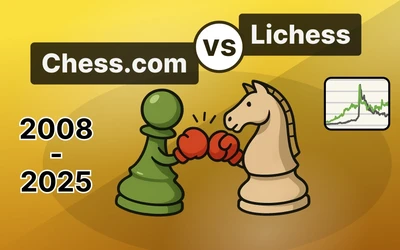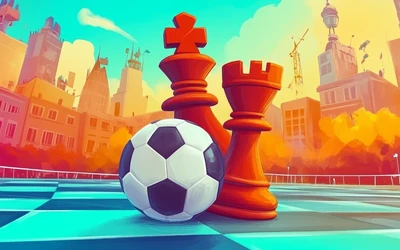
https://www.youtube.com/watch?v=RQm5lGne5_0
Is Playing Blindfold Chess Worth It?
Can blindfold chess improve your game or is it just some party trick?Often times when people hear "blindfold chess", they imagine super GMs casually premoving a mate in 5 on an invisible board, while spectators are speechless. But beyond this whole show, one big question remains: is blindfold chess actually useful towards improvement, or is it just a skill high level players show off to their friends?
Blindfold Chess As A Training Tool
To no ones surprise, blindfold chess actually has benefits behind it, especially if used carefully. It can help with calculation as you constantly have to visualize positions in your head. Playing blindfold chess is also a good training tool when it comes to evaluating positions without seeing them physically on the board. You also strengthen your short term memory and attention to detail; for example, when playing blindfold, you must always stay focused. Once you lose the position in your head, it will be very hard to comeback, just like in regular chess; you must keep track of the position at all times.
The Truth
As cool as blindfold chess seems, if you are under the rating of 2100, blindfold chess should 100% not be involved in your training. For intermediate players, you will see much more benefit in your game by practicing tactical training, positional understanding, endgame practice, etc. The vast majority of your improvement will not come from being able to calculate 12 moves ahead blindfolded; it will most likely come from avoiding blunders, recognizing patterns, and understanding basic principles. In some cases, blindfold chess won’t fix your bad habits; it can even reinforce them if you’re not careful.
In fact, for many lower-rated players, trying to play blindfold can lead to frustration, discouragement, and wasted time.
Exceptions
For more experienced players (2300+ online or 1900+ otb), although maybe not your first priority, blindfold chess can be a fun side training tool you can use during your free time instead of launching hundreds of bullet games. At this level, opponents you face have developed deep calculation skills, and will not be blundering one-move tactics or basic positional concepts (at least I hope so). Games are usually won through depth of calculation, positional strategies, and being able to keep track of multiple different variations in your head. This area is where blindfold chess has some sort of value. This is because, as mentioned earlier, blindfold training helps you hold complex positions mentally, which reduces calculation leakage (forgetting pieces, squares, or lines mid-variation). High-level games also often involve sustained calculation; 10-15 minutes of thinking for one move. Blindfold training helps you build mental stamina to hold positions without physically seeing them, which carries directly into OTB play.
Usage
As mentioned earlier, blindfold chess should never be your first priority. At a high level, routines such as deep game analysis, endgame work, game studies, opening prep, and advanced tactical training should always come before playing blindfold in an improvement standpoint. Even though blindfold can become a sharpening tool for visualization, it won't replace these.
A recommendation on when to play blindfold is during free time and after tactical training. For example, when your bored, don't just spam 1+0 games with no reason behind it. Instead you could try and play a 10+5 / 15+10 blindfold game with a training partner. After a tactical workout, if you feel it went well and your sharp, playing blindfold can also be a great choice to take these skills into a game.
Conclusion
On the surface, blindfold chess seems really cool to start training, but it comes with some rules to follow.
Is it useful? If used correctly; if you are already a high-level player, it can be great for visualization.
Should it be used for primary training? No; it is should be used as a fun useful side tool you can try with your friends.
Is it dangerous? For lower rated players, yes. Blindfold can interfere with proper chess development as it prioritizes guessing over calculation, creates mental frustration and burnout, builds sloppiness instead of precision, and wastes valuable improvement time.
Will it impress family and friends? Without a doubt, yes!
To wrap up this blog, think of blindfold chess like heavy weight training for an athlete. If your fundamentals are solid, it makes you stronger. If your fundamentals are weak, it breaks you.
Thanks for reading, and if you have any questions feel free to ask!
You may also like
 BTRex2010
BTRex2010A guide to stay calm under pressure in OTB
A guide to stay calm under pressure in OTB ChessMonitor_Stats
ChessMonitor_StatsWhere do Grandmasters play Chess? - Lichess vs. Chess.com
This is the first large-scale analysis of Grandmaster activity across Chess.com and Lichess from 200… OnTheQueenside
OnTheQueensideHow many women have beaten super-GMs?
It's happened over 50 times! BTRex2010
BTRex2010TMC Cash League Round 3 - Updates & Announcements
Important updates within our team during the bye week BTRex2010
BTRex2010A guide to success in lichess marathons
A guide to success in lichess marathons FM MathiCasa
FM MathiCasa